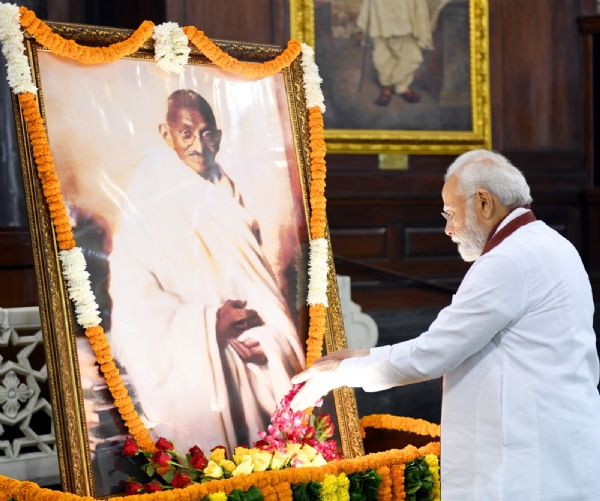
-Leadership Across Generations
-Mobilizing India: Gandhi and Modi's Legacy
-Two Icons, One Goal: India's Transformation Journey
By, Prof. Jasim Mohammad
Gandhi Jayanti, a day that reverberates throughout India and resonates around the world, marks the birth anniversary of the iconic activist-lawyer, Mohandas Karamchand Gandhi. Commonly known as 'Father of the Nation' and 'Mahatma Gandhi' or 'Bapu Ji,' he was born on October 2, 1869. his birthday is annually being celebrated in India, dedicated to commemorating his indomitable spirit and profound ideologies. It's not just a national observance; it has also received global recognition. In 2007, the United Nations declared October 2 as the 'International Day of Non-Violence' during a General Assembly session on June 15.
Mahatma Gandhi's legacy looms large in India's history, leaving an enduring impact on the nation's path to freedom. His unwavering commitment to nonviolent resistance galvanized a diverse population, leading to the successful struggle against British colonial rule. The Salt March, a symbol of civil disobedience, exemplified his ability to mobilize ordinary citizens against unjust laws, igniting a nationwide movement for independence.
In a different era and with distinct approaches, Narendra Modi, another towering figure in Indian politics, also stirred the masses. His magnetic charisma and adept use of technology brought millions together under the banner of a modern India. Grand rallies, characterized by his persuasive eloquence and unwavering conviction, awakened patriotic fervor. Initiatives like Swachh Bharat not only demonstrated his dedication to national progress but also encouraged public participation, motivating citizens to actively shape the country's destiny.
Despite differences in ideology and time periods, both Gandhi and Modi are instrumental in uniting and mobilizing the Indian populace for noble causes.
Today, as India navigates complex global economic and geopolitical challenges, there is a strategic effort to develop a self-reliant domestic market infrastructure. This is seen as crucial for India's international positioning. The Swadeshi movement, which advocates for indigenous Made In India products and cultural practices like yoga, can be traced back to the ideological foundation laid by Mahatma Gandhi. Prime Minister Narendra Modi's policies have echoes of this movement.
Gandhi's Swadeshi movement was rooted in the promotion of self-sufficiency and the rejection of foreign goods, as outlined in his seminal work Hind Swaraj. This movement reached its zenith with the iconic Dandi March in 1930 and was marked by actions such as boycotting British textiles and salt.
Eminent economic historian Tirthankar Roy's research highlights the profound impact of the Swadeshi movement on indigenous Indian industries. It catalyzed the growth of sectors like textiles, paper, and chemicals, reinforcing Gandhi's vision of self-reliance.
In the contemporary context, Prime Minister Modi's 'Make In India' campaign seeks to rejuvenate domestic manufacturing and attract foreign investments. Research from the Confederation of Indian Industry (CII) supports this effort, illustrating its transformative effects on various manufacturing sectors and the subsequent increase in job opportunities.
Modi's global promotion of yoga draws from its ancient, holistic, and health-benefiting principles. Numerous studies, including a comprehensive review by The Lancet, attest to yoga's effectiveness in promoting mental well-being, reducing stress, and enhancing physical harmony. This recognition underscores yoga's role as a potent Soft Power tool, elevating India's ability to build cross-cultural connections beyond economic transactions.
Gandhi Jayanti not only commemorates the life and teachings of Mahatma Gandhi but also serves as a reminder of India's rich history of nonviolent resistance and self-reliance. As the nation faces contemporary challenges, these enduring principles continue to guide its path toward progress and prosperity. The legacies of Gandhi and Modi, each distinctive in their own right, intertwine to shape India's journey into the future.
(Author is Professor in Comparative Literature, AUS & Chairman, Centre for Narendra Modi Studies (CNMS), New Delhi.
Hindusthan Samachar/ Indrani Sarkar





